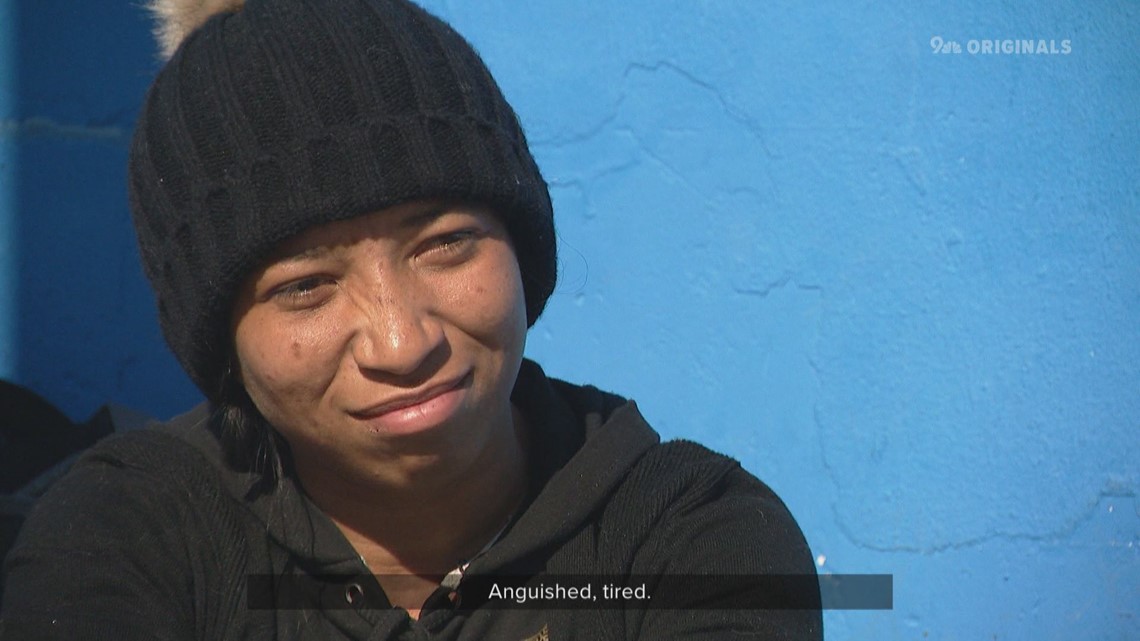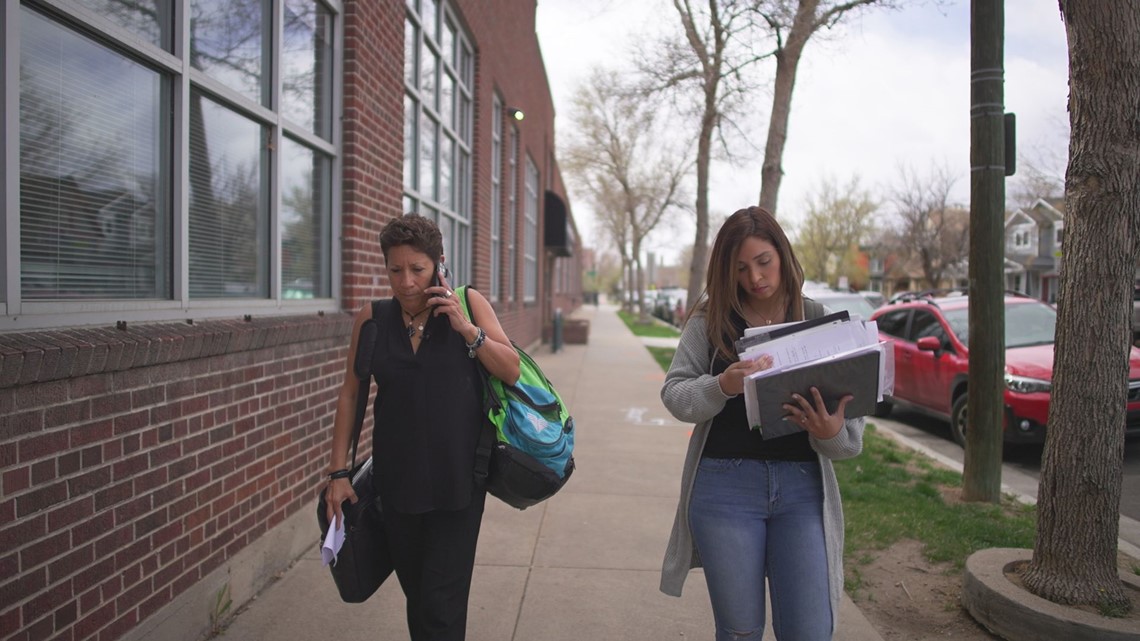Migrants share struggles, accomplishments in creating a new life in Denver
A 9NEWS documentary follows the lives of migrants from Venezuela.

A team from 9NEWS spent a year following migrants as their journey from South America brought them to Denver. It became an unexpected destination for many migrants arriving at the southern border.
Within 12 months, more than 30,000 migrants made it to Denver as resources continued to dwindle to offer support as the year continued on. By the end of 2023, migrants had found themselves living on the streets with little to survive.
How to watch: You can watch Una Vida Nueva on the 9NEWS app, Roku or Firestick. You can also watch it directly here.
Chapter 1 Migrants begin arriving at the U.S.-Mexico border
The first migrants began arriving in late 2022. By the end of December, thousands of migrants had made their way to Denver. The city didn't know it then, but within a year, more than 30,000 migrants would find themselves traveling through Denver or staying to establish their lives here.
For the large majority, migrants who made it to Denver crossed the border in El Paso, Texas. Some crossed without getting authorization, while others went through immigration with the Department of Homeland Security.
Denver became an unlikely destination for migrants who made it to El Paso with a one-way bus ticket costing $90.


"I came with my kids," said Maria, a migrant who made it to El Paso in January. "It was really difficult. We have been traveling for four months since we left, through the jungle. Mexico was really difficult."
Maria arrived with her husband and two kids, Jose Angel and Mariangel.
"My childhood was perfect. I never lacked anything I needed, and that was what led me to leave the country because I never lacked anything and saw my children were in need," Maria said. "They didn't have anything to wear. They didn't have shoes and I cried, I said, 'I can't have my children like this.'"
Maria left Colombia in September 2022., where she had been living for about two years due to the economic turmoil in her home country of Venezuela. They had been there for about two years when they decided to leave for the United States.
"We arrived at the border wall and there, jumping over fences and everything. It was the only way we could get through, and we passed during the night. Apart from that, we arrived on this side, and we had to hide in a garbage container," Maria said. "We hid in a garbage dumpster where we spent the night, so we could get here to the church."
After the family crossed into the United States, they slept at Sacred Heart Church in El Paso, a church that transforms into an overnight shelter.
"The moment was just extraordinary," said Jefferson, recalling when he finally made it to the church that is considered a landmark for many migrants. "I just remember coming to this place, this area, and I started crying after everything that had happened."
Sacred Heart offered respite to migrants who had recently crossed with time to come up with a plan to continue their journey to other cities in the United States. It took Maria three weeks for her and her husband to come up with enough money to continue traveling and to come up with a plan.
Like many others, Maria found herself stuck in El Paso, unsure how to continue now that they made it to the United States. For those who crossed without authorization, immigration checkpoints on major highways surrounding border communities posed a problem to migrants who wanted to go to other destinations throughout the U.S.
"I feel anguished, tired," Maria said. "We don't know what to do. We don't have any answers. We don't have a solution to our problems since this is not a normal situation."
Many spent several weeks in El Paso, coming up with both a plan and money. Within a month of meeting migrants at the border, many shared with us that they had arrived in Denver. It took most roughly a month or a little less.
Maria originally wanted to go to California, where she knew some friends from Venezuela. She and her kids ended up getting on a bus to Denver.
RELATED: Migrant family separated from family dog, gets to visit while waiting for permanent reunion
Chapter 2 Arrival in Denver
Denver became an unlikely destination for migrants. Denver offered an affordable bus ticket from El Paso.
"I arrived here by bus to Denver," Roberto said. "It was a calm journey. Everything was calm."
For just a $90 one-way ticket, newcomers could arrive in Colorado and in a relatively large city without spending hundreds of dollars to get to another option like New York or Chicago.
"It's really strange to see such a developed city after so many months on the road, traveling through the jungle, beaches and cities," said Roberto about his first impression of the Mile High City.
While many others came to Denver with a plan to stay, Roberto knew Denver was not the end of his journey. His final destination was Canada.
"I do feel free now. It's a journey," Roberto said while in Denver. "We still have a little bit of difficult roads ahead, but the truth is I feel free. I'm in a country with freedom."
The city paid for his bus ticket to Canada, figuring it is cheaper to bus migrants out of the city than to house them in a hotel-turned-shelter.
Thousands of migrants have been sheltered by the city. In mid-January 2023, the city implemented a rule that allowed migrants to only stay 14 days in the shelters.
"Truly, 14 days is nothing because when you arrive in the area, you don't speak the language of the people here, English. We don't know the area. We don't know anyone, and it's very hard to interact with people and look for work," said Luis Jose, a migrant who arrived in Denver in January 2023 while the rule went into effect.
Over the past year, the city has changed its sheltering rules multiple times, meaning some migrants were sheltered for more than two months and others for only two weeks.
During their time in the shelter, migrants are faced with a timeline to find both work and housing. For some, they are able to lock down a job and an apartment in time. Others are unable to, competing with hundreds of other migrants in a similar position.
Chapter 3 The hunt for work
In their first days and months, many rely on day labor and odd jobs to get by.
When he first arrived, Wilmer spent everyday going to Home Depot, asking contractors purchasing supplies at the store for a job for a day.
"I am going there because sometimes there is an opportunity for work," said Wilmer, knowing some days he would successfully get hired and others, he would walk away empty-handed.
Sometimes, migrants will ask for day labor and get a job just for a few hours. Other times, they will get employed for the week.
"I don't have any idea what kind of job I might be able to get," said Wilmer, as he was walking to Home Depot. "When I receive it, I do it."
Others became self-employed by making food or other items for sale.
Chapter 4 Nonprofits step in
Nonprofit organizations quickly stepped in to help. Both ViVe Wellness and Papagayo began mobilizing to get migrant families into housing. The two organizations worked together in partnership to place families in apartments throughout the Denver metro area.
Once migrants began arriving, ViVe focused entirely on getting migrants out of the shelter and into permanent housing, rather than something temporary or otherwise considered transitional housing. Previously, ViVe created educational courses for children as well as exercise programs.
ViVe and Papagayo began covering the cost of the deposit for the apartment, as well as the first month's rent. The State of Colorado's Office of New Americans supplied most of the funds to make the housing program possible.


"For me, hearing that and seeing those checks come out, knowing that people are making it, it's a huge thing for me," said Casas, speaking about the deposit checks that families would receive to get the keys to their apartments.
During peak times of arrivals, Casas placed dozens of people everyday in apartments to call their own home. July 2023 was the organization's busiest month in terms of placement, with 208 adults and 186 children finding housing through their housing program.
Over 2023, ViVe spent an estimated $3.1 million in migrant support. Most of the funds were spent specifically for housing.
"It's like when they say that you are in love, that your body gets butterflies. It's the same, to walk in and feel that emotion. It's overwhelming. It's something overwhelming," said Fabiola, a mother who found an apartment with the help of ViVe's team.
"This is not temporary sheltering, they have homes," Casas said.
Chapter 5 Strained City Resources
Title 42 expired in May 2023. While the city expected a peak in migrant arrivals sometime thereafter, officials did not expect another influx prior to Title 42 expiring.
"I'm going to cut to the chase and be very clear. We're in desperate need of emergency shelters space to accommodate," said former Mayor Michael Hancock, once the city began seeing close to 400 migrant arrivals per day.
"Denver cannot continue to financially shoulder this burden alone," Hancock said at a May 2023 news conference. "Our reserves are not bottomless, and if this situation extends for police for a prolonged period of time, some hard choices are going to have to be made. And to be clear. My team and I are already beginning to talk about service cuts."
The city set up a migrant registration center at a parking garage at the Auraria Campus. Some families were sleeping there for three nights in order to get placed at a shelter or to receive a paid-for bus ticket to go to another destination.
Due to strained resources, demand for jobs and shelter deadlines, migrant encampments began to establish in summer 2023 in the Ruby Hill neighborhood.
"We don't like it, but it is what it is. Life is not easy starting out. It's hard," said Gio, a migrant who had used the little money he had to buy a small RV so he wouldn't have to sleep in a tent.
By September, other encampments started growing across the city. Most notably, one established itself off of Zuni Street in north Denver.
"You are sad because you start thinking and the sadness hits you. You have never been like this. I have never lived like this," said Arianna, who was sleeping in a tent in the fall with her husband and her son. "In every way. The cold stresses him out, like all children. The cold makes him really cold, and he asks me to warm him up, so I have to wrap him up and keep him warm and look for water."


Once families with children began sleeping on the streets, the city changed its length of stay policy to give families the most amount of time to establish themselves with work and an apartment.
Chapter 6 Changes in 2024
Mayor Mike Johnston has continued to implore the federal government for additional funding and help in solving the migrant crisis.
In February, Johnston announced budget cuts to several departments, citing needing funds from different departments to support the migrant crisis in Denver.
"While they’re the first steps, they unfortunately will not be the last and may not be the hardest," Johnston said.
The city has also been active in preventing encampments, creating additional resources and case management to migrants before they exit the shelters. Nonprofit groups such as ViVe Wellness and Papagayo continue supporting migrants to find housing.
SUGGESTED VIDEOS: Migrants in Colorado

